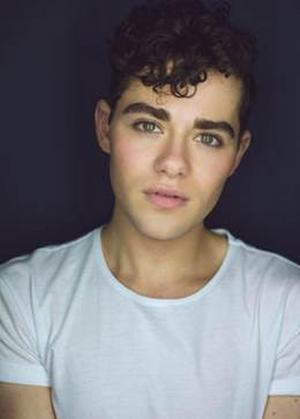Interview: Misha Osherovich Talks FREAKY, Mental Health, & Their Own Films
'Freaky' is now available to stream on VOD.

Misha Osherovich stars in "Freaky," a horror-comedy also starring Vince Vaughn and Kathryn Newton. The film was released on digital December 4th, 2020.
To celebrate the release, BroadwayWorld caught up with Misha via email to talk about the film, their own films, mental illness awareness, and their work with the LGBTQIA+ community.
Misha most recently recurred in the television series NOS4A2 for AMC and appeared in the Warner Brothers feature film THE GOLDFINCH. Misha has amassed numerous stage credits, including A CLOCKWORK ORANGE for New World Stages in New York and HENRY IV at Martha's Vineyard Playhouse.
In 2019, Misha produced and starred in the short film E.very D.ay which screened at several film festivals in the United States and internationally, racking up awards including "Best LBGT Film" for The IndieFEST and "Best Experimental Short Film" for Top Shorts Film Festival.
In addition, Misha, who identifies as non-binary, is committed to using their platform to amplify LGBTQIA+ voices and demystify body image and mental health, especially within the queer community.
Read the full interview below!
Tell me about your experience working on "Freaky!" What's it like to work at the intersection of horror and comedy?
Working on this film was such an education. I'd never been in an on-camera project that is so (by nature) theatrical. I ended up drawing on a lot of my stage training to keep the stakes as high as they need to be in a film like this. Working with Vince Vaughn especially was a crash-course in improv comedy. He tries something new every single take, so you have to be ready to match him. And as for the horror element: the beauty of working with a director like Chris Landon is that he sets everything up so perfectly - the blood, the set, the scene is all there waiting for you when the camera starts rolling. Your only job as an actor is to just act (and scream) as truthfully as you possibly can within the crazy circumstances that Chris has built.
You also work as a producer on your own film projects. What changes about your experience in front of versus behind the camera?
Producing my own work was truly eye opening. I'd say the biggest lesson I took away from working behind the camera is empathy. Empathy for the crew, the costume team, lighting, everyone. We are all on a set trying to do our best work and the pieces all really have to gel for the product to shine. It's easy to forget that you are not, in fact, the center of the universe as an actor on a set. I have a deeper appreciation for everyone's role in making a film now.
Can you tell me a little bit about the work you do inside the LGBTQIA+ community?
For sure. I'm a big advocate for mental health access and awareness in the queer community. I have a history of my own mental health struggles: I am now sober and in active recovery from an eating disorder. I work with organizations like NEDA (National Eating Disorders Association) and VideoOut to have more frank and easily accessible conversations about mental health in the queer community. I believe that de-mystifying mental health struggles and MAKING IT EASY to talk about (by creating art about it, producing social media campaigns, speaking publicly about it etc.) is the best way to encourage queer folks to seek the mental healthcare that best suits them.
How have you worked to unpack the stigmas of mental illness and body image issues in your work?
My first big stab at this was writing and producing my short film "E.very D.ay" and sending it out on the festival circuit. The film is a really intimate and messy look at the minds of two people living with active eating disorders. Body image issues in particular have been so blatantly misrepresented in mainstream media. An eating disorder and distorted body image can affect literally anyone. But to this day we have not found an easy or inclusive way to talk about body image issues. I aimed to open up that conversation with my film - I always hosted a talkback after screenings of it to allow the audience to ask their questions about eating disorders - often times questions they have not been able to or have not thought to ask before.
Beyond filmmaking, I'm simply open. I'm honest about my triumphs in my recovery as well as when I fall down. It's one of the main things I use my social media for. I hope that in being transparent about when recovery looks like - especially as a queer person - I can encourage others to seek the help they may need. Ideally, the work that I do will help do away with the secrecy and shame that often surrounds body image and mental health struggles.
Watch the trailer for "Freaky" here:
You can watch "Freaky" here.
Comments
Videos

